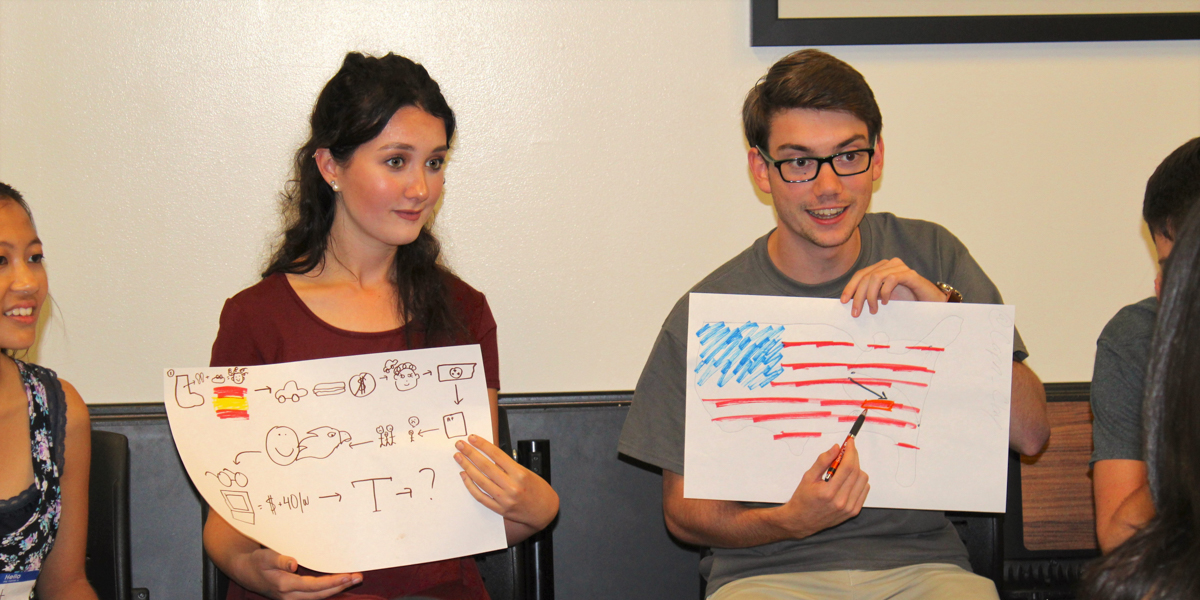By Wesley Smith
It is a sunny afternoon in April and I receive a phone call from an unknown number. I ignore it. At this point, my college choice is down to two and I am running out of time. I check the voicemail and the call is from Meghan Perez, a name I know only because of its appearance at the bottom of several emails I have received from the Honors Leadership Program at the University of Tennessee.
I call her back to tell her I have not made a decision, expecting to leave it at that. By the end of our conversation, however, I have decided I am going to be a Volunteer. We will save the content of that call for later, but for now let us skip ahead to a sizzling Saturday afternoon in late August.

The Saturday after our first week in college, the inaugural Honors Leadership Program cohort was required to attend an eight-hour orientation. It had been four months since I decided I wanted to be a Vol, and over a year since Ms. Perez began building an honors program from the ground up. However, on this day we all came together for the first time under one roof. I think it is safe to say there was an overwhelming feeling of unspoken anxiety in that room.
Pioneers enjoy the great wonders of the frontier, but they are also forced to encounter the perils of the unknown. At this point, the program was all assumptions. I assumed I would be surrounding myself with great and ambitious individuals. I assumed the program would have a plan to make us the leaders we strive to become and I assumed everyone saw the great potential in this program. I was anxious to find out if these assumptions were true, and I knew the orientation would bring answers.
The day began with an information overload—which, believe or not, relieved me. We walked through every detail of what we would be doing for the next four years, and I realized how this plan would truly strengthen my leadership. There would be opportunities for us all to learn in the classroom and then apply the knowledge through professional shadowing and internship opportunities in our respective fields. That took care of one assumption, but there were still questions needing answers.

Luckily, the rest of the day allowed us to get to know each other beyond the surface-level conversations we had had that first week in our dorm. We were asked to share very personal topics, including what made us who we are and what keeps us motivated. Each time someone shared their story, I grew a greater appreciation for them.
The diversity in the room went well beyond skin color. It became clear that the different backgrounds we came from shaped our own unique and individual perspectives. These perspectives and ideas bled into our next discussion, on leadership and what that meant to each of us. The final two activities, however, took care of my final two assumptions. With no additional guidance, we were asked us to come up with our own expectations for one another as a cohort, and it was up to us to decide what they would look like.
Everyone contributed and we civilly talked through each point, modifying it until everyone agreed. Each point had to have unanimous agreement. We came up with 15 points to shape the expectations of our cohort, my personal favorite being “Take your cool cap off.” This seemingly goofy expectation reminded us that we were all in this together.
Toward the end of the orientation we began the inauguration of our cohort into the program officially, and this final task of orientation was perhaps the most revealing. We wrote the legacy we hoped to leave at UT on a rock and placed it in a basket. The rock symbolized the Rock on campus, which communicates messages to a mass of people.

Writing out hope on a rock symbolized the permanence in the hopes that we want to communicate to those on campus and beyond. While no one was forced to share, every single person did. Each goal was different, yet all were ambitious. By the end of that afternoon, I knew I was surrounded by a talented group of students on campus and that our program would help us meet our full potential and grow into the people we desired to become.
Now, back to the call that brought me to UT. In full disclosure, I told Ms. Perez how I really felt about my college choices. I knew that compared to my other option, I had a greater potential to succeed at the University of Tennessee. However, it is a big school. Ms. Perez encouraged that while it is a big place, that also means there are opportunities to make a big difference. However, it was her next point that really sold me. She reminded me of the great resources the University of Tennessee has and stressed the opportunity I would have to shape my legacy as a member of the first class of the Honors Leadership Program.

That was enough to sell me at the time, but I have become even more excited after orientation and the first couple of months on campus. Surrounding me are 49 other students who probably came to a similar realization.
While the legacies we hope to build are not the same, they do share common threads. We all want to enact positive change on our university and the greater community. We all want to grow personally so that we can become the leaders that we have the potential to be. We want to learn as much as we can from as many different people as we can so that we can be socially conscious, culturally aware, and emotionally intelligent leaders.
